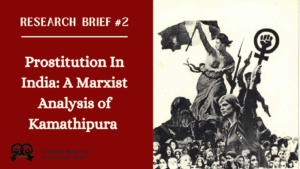ABSTRACT:
Like most commercial transactions under capitalism, prostitution is based on the sale and purchase of a commodity. In common parlance, a prostitute “sells her body”. With capitalism penetrating every aspect of human life, prostitution as a phenomenon also needs to be understood in the erstwhile socio-economic context. Hence, this paper seeks to understand prostitution through a Marxist framework to lay bare the hidden relations of labour and capital. This is established through a case study of Kamathipura, the largest red-light district of Mumbai. The paper further delves into a Marxist analysis of the existing policies and laws by the Indian state to regulate prostitution. This is followed by policy suggestions and recommendations to empower and emancipate prostitutes. This paper grapples with questions like how is prostitution conceptualised within the Marxist framework? How do the power dynamics in the act of prostitution reflect broader social inequalities in capitalist and patriarchal societies? How can a Marxist theory of prostitution be applied to the sex work industry in Kamathipura? How does the intersection of gender, caste and class in Kamathipura impact the nexus of exploitation and the experiences of the workers?
AUTHORED BY:
- Deveshee Chatterjee is a 2nd-year Political Science student at Lady Shri Ram College for Women, DU and a research intern at Mandonna.
- Sanika Singh is a 2nd-year Political Science student at Miranda House, DU and a research intern at Mandonna.
- Soumya Arora is a 3rd-year Political Science student at Jesus & Mary College, DU and a research intern at Mandonna.
- Vandya Bisaria is a 3rd-year Psychology student at Lady Shri Ram College for Women, DU and a research intern at Mandonna.
EDITED BY:
- Charu Pawar is a 3rd-year Political Science student at Lady Shri Ram College for Women and the Head of Research at Mandonna.
To read further, click “access me”


